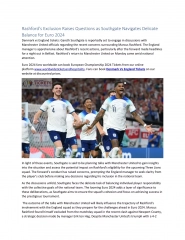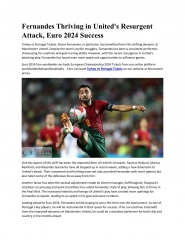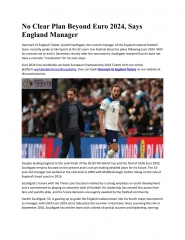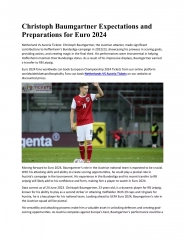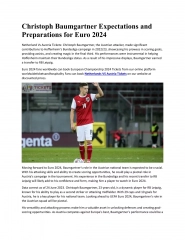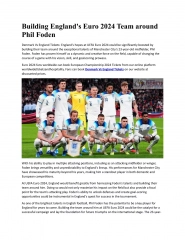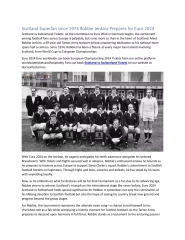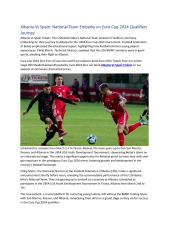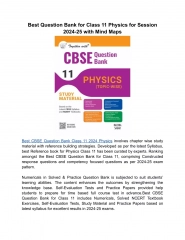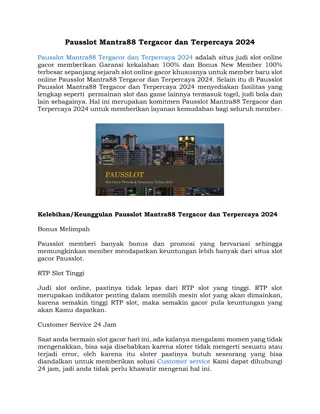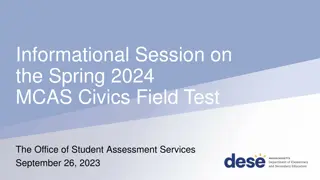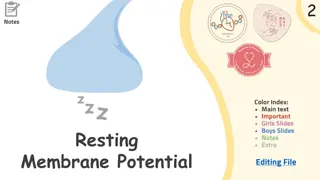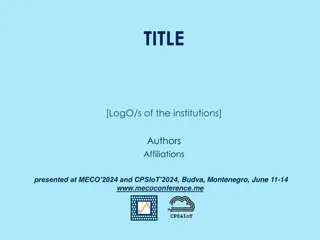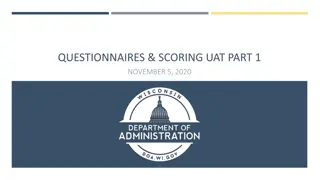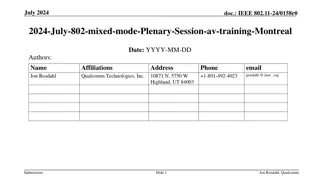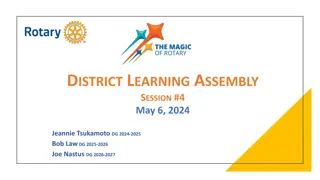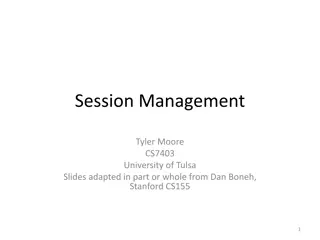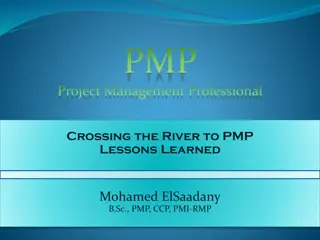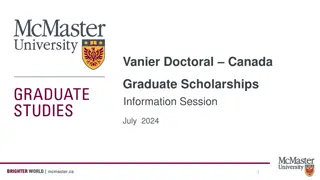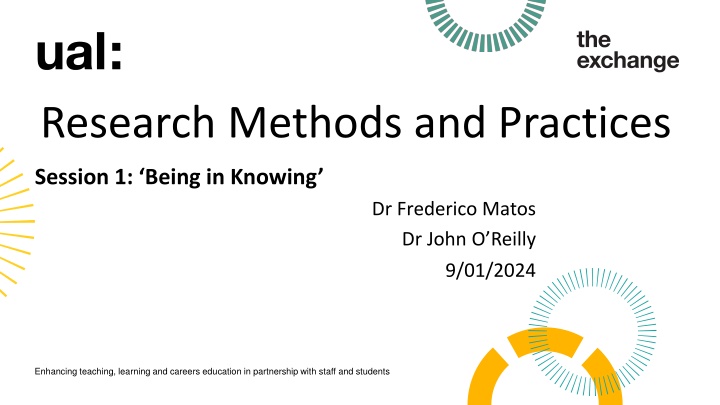
Enhancing Teaching, Learning, and Careers Education through Research Methods and Practices
Explore the session on research methods and practices led by Dr. Frederico Matos and Dr. John O'Reilly, focusing on enhancing teaching, learning, and careers education in partnership with staff and students. Delve into important concepts in research, ontology, and epistemology, alongside group work and critical discussions.
Download Presentation

Please find below an Image/Link to download the presentation.
The content on the website is provided AS IS for your information and personal use only. It may not be sold, licensed, or shared on other websites without obtaining consent from the author. If you encounter any issues during the download, it is possible that the publisher has removed the file from their server.
You are allowed to download the files provided on this website for personal or commercial use, subject to the condition that they are used lawfully. All files are the property of their respective owners.
The content on the website is provided AS IS for your information and personal use only. It may not be sold, licensed, or shared on other websites without obtaining consent from the author.
E N D
Presentation Transcript
Research Methods and Practices Session 1: Being in Knowing Dr Frederico Matos Dr John O Reilly 9/01/2024 Enhancing teaching, learning and careers education in partnership with staff and students
Todays session 1.30pm-2.45pm: Introductions Module organisation Assessment Q&A 2.45-3.05pm: break 3.05pm-4pm : Ontology, Epistemology. Group work - Critical discussion of Grix reading
Todays session Overview of the unit and unit structure Starting to reflect on the nature of research Important concepts in research Where can we situate ourselves within a research space/project? Research Methods and Practices 3
Q&A What are your expectations for the unit? What are your anxieties for the unit? Q&As Research Methods and Practices 4
Structure of the unit: Tues 9 Jan, 11am-1pm: MA induction 12 March, 2-3pm, optional drop-in re summative assessment [online] Tues 9 Jan, 2-5pm: session 1, Introduction, Being in Knowing Tues 9 April, 2-5pm: session 6, (Re)Locating and (re)mobilising Research Practice(s) Tues 23 Jan, 2-5pm: session 2, Positionings, Reflexivity and Criticality Tues 23 April, 2-5pm: session 7, Researcher as Agent for Change 30 Jan & 31 Jan, Individual Tutorials (on Teams) Tues 30 April & Wed 1 May, Individual tutorials (on Teams) Tues 6 Feb, 2-5pm: session 3, Ways of Research: Methodologies and Methods Tues 7 May, 2-5pm: session 8, Ethics as Practice Tues 20 Feb, 2-5pm: session 4, Ways of Knowing: Perspectives, Positions and Relationality Tues 21 May, 2-5pm: session 9, Research proposals, journeys and problem spaces 27 Feb & 28 Feb, Individual Tutorials (on Teams) 28 & 29 May, Individual tutorials (on Teams) Tues 5 March, 2-5pm: session 5, Knowing in Progress Tues 4 June, 10am-4pm: Major Project proposal presentations 5 Research Methods and Practices
Learning Outcomes Upon successful completion of this unit you will be able to: Articulate your researcher positionality, in relation to disciplinary practices, research philosophy and ethics. [Communication] Identify a focussed research topic that has value for you as a researcher, demonstrating how this research connects to relevant fields of study. [Enquiry] Explore new ways of knowing made possible through decentreing research practice. [Knowledge] Evaluate different methods of enquiry. [Process] Design a feasible research proposal that resonates with your experiences and interests. [Realisation] 6 Research Methods and Practices
Summative Assessment Submission Part 1 - Friday 22March 2024, 5pm [adjusted 5 April] Part 2 - Monday 1 July 2024, 5pm [adjusted 15 July] Submit your work via Moodle Assessment format: The unit will be assessed holistically through four components. All four elements must be completed to meet the learning outcomes and successfully complete the unit. Research Methods and Practices 7
Summative Assessment: Part 1 Submission: Friday 22March 2024, 5pm Submit your work via Moodle Positioning statement (1000 words) An annotated bibliography with an evaluative summary of how 6 texts collectively inform a research idea (2500 words) Research Methods and Practices 8
Summative Assessment: Part 2 Submission: Monday 1 July 2024, 5pm Submit your work via Moodle An evaluative account of a small-scale research exercise (1500 words) A research proposal (2000 words) Research Methods and Practices 9
Summative Assessment Submission Friday 22March 2024, 5pm Positioning statement A written statement positioning yourself within a field of practice: Relate your practice/s to relevant fields (disciplinary and interdisciplinary) with reference to a suitable literature. Document or map how you and others use processes of enquiry within these making practices. Examine how these processes may shape your sense of your researcher self. Research Methods and Practices 10
Summative Assessment Submission Friday 22March 2024, 5pm An annotated bibliography with an evaluative summary of how the texts collectively inform a research idea (2500 words) Select, read and summarise the key arguments of six texts (approx. 300 words each) that link to your chosen research topic and/or influence your approach to research. The evaluative summary (approx. 700 words) should explain how these texts have enabled you to refine your project idea. Research Methods and Practices 11
Summative Assessment Submission Monday 1 July 2024, 5pm An evaluative account of a small-scale research exercise (1500 words) As you develop your research idea, you will be encouraged to identify relevant data collection approaches. During the course of the unit, you will select and trial one of these data collection approaches to familiarise yourself with practical aspects of doing research. This could be designing a questionnaire and piloting it, conducting and analysing a short interview or observation, recording field notes, or completing a content analysis or auto-ethnographical or narrative piece linked to your topic, amongst others. Core to this exercise is an evaluation of your learning and what you might do differently next time. Research Methods and Practices 12
Summative Assessment Submission Monday 1 July 2024, 5pm A research proposal. (2000 words) Learning on the unit culminates with production of a research proposal that will form the basis for your major project. You will complete this by following a template (that can be adapted in consultation with your tutor) to ensure that you engage fully with all aspects of the research process within your selected paradigm. Research Methods and Practices 13
Who are we as researchers? What do we know? - What skills and knowledges are we bringing to the course? Can be anything. Find images of a researcher Group discussion Research Methods and Practices 14
What comes to mind when you think about research methodology? Research Methods and Practices 15
What does research mean for us? What is the purpose of research? Why do it? What does it say about us? What can we research? Research Methods and Practices 16
How do we go about thinking about research? Ontological considerations Epistemological considerations Methodological choices Methods Sampling Ethical considerations Research Methods and Practices 17
Some important concepts we will be dealing with Paradigm Ontology Epistemology Methodology Methods Ethics Research Methods and Practices 18
BREAK Research Methods and Practices 19
What is a paradigm? Research Methods and Practices 20
Paradigm A paradigm is a cluster of beliefs and dictates which for scientists in a particular discipline influence what should be studied, how research should be dine, [and] how results should be interpreted (Bryman 1988: 4) A conceptual or methodological model underlying the theories and practices of a science or discipline at a particular time; (hence) a generally accepted world view (OED) Systems of thought or sets of values that affect perceptions of reality; the dominant paradigm is the standard system of values at a given time Research Methods and Practices 21
What do we understand by Ontology? Research Methods and Practices 22
Ontological considerations The starting points in research are assumptions. For example: About the world, the social world, people About knowledge, what types can be created About research, and the role of the researcher Some dictionary definitions of ontology: concerned with the nature of being the study of the nature of being study of the nature and essence of things What actually exists? What exists in the social world for us to study? Is there a social reality? What is the nature of social reality? Research Methods and Practices 23
What do we understand by Epistemology? Research Methods and Practices 24
Epistemological considerations Some definitions: the theory of knowledge, especially the critical study of its validity, methods and scope , the branch of philosophy that deals with knowledge the part of philosophy that is about the study of how we know things What is knowledge? How do we acquire knowledge? Are there different ways of knowing? Are there different types of knowledge? Is there a truth? What is truth? What about our beliefs? What about our experiences? Research Methods and Practices 25
It is also important to consider the following: Objectivity/subjectivity Deductive/inductive Research Methods and Practices 26
CRITICAL READING & DISCUSSION OF GRIX (2002) General: Present the key elements of the paper Critique the paper, for example: Challenge the writer s assertions Support the writer s argument Quote from the paper/highlight key sections/ statements (thinking ahead) How might this material be useful for the essay & proposal? Specific questions: Why does the author think it is important to learn about ontology and epistemology? How does the author define ontology & epistemology? How does the author conceptualise the relationship between ontology, epistemology, methodologies & methods? Research Methods and Practices 27
For next session review and critique 2 of the following articles Keshavarz, Mahmoud (2016) Design-Politics: An Inquiry Into Politics, Camps and Borders. PhD Thesis (extract) Miles, M. and Rainbird, S. (2015) Evaluating interdisciplinary collaborative learning and assessment in the creative arts and humanities, Arts and Humanities in Higher Education 2015, 14(4) Riley, H. (2014) Channels of vision and the poetics of drawing: Strategies for teaching, Arts and Humanities in Higher Education, 13(3) Scott Shields, S. (2015) Like climbing Jacob s ladder: An art-based exploration of the comprehensive exam process, Arts and Humanities in Higher Education, 14(2) Shreeve, A. (2010) A phenomenographic study of the relationship between professional practice and teaching your practice to others, Studies in Higher Education, 35(6) Research Methods and Practices 28
References Bryman, A. (1988) Quantity and Quality in Social Research (1st ed). London: Routledge Grix, J. (2002) Introducing Students to the Generic Terminology of Social Research , Politics, 22(3), pp. 175-186. Keshavarz, Mahmoud (2016) Design-Politics: An Inquiry Into Politics, Camps and Borders. PhD Thesis (extract) Miles, M. and Rainbird, S. (2015) Evaluating interdisciplinary collaborative learning and assessment in the creative arts and humanities, Arts and Humanities in Higher Education 2015, 14(4) OED Online (2022) "paradigm, n.". December 2022. Oxford University Press. https://www.oed.com/viewdictionaryentry/Entry/137329 (Accessed January 05, 2023). Riley, H. (2014) Channels of vision and the poetics of drawing: Strategies for teaching, Arts and Humanities in Higher Education, 13(3) Scott Shields, S. (2015) Like climbing Jacob s ladder: An art-based exploration of the comprehensive exam process, Arts and Humanities in Higher Education, 14(2) Shreeve, A. (2010) A phenomenographic study of the relationship between professional practice and teaching your practice to others, Studies in Higher Education, 35(6) Research Methods and Practices 29

